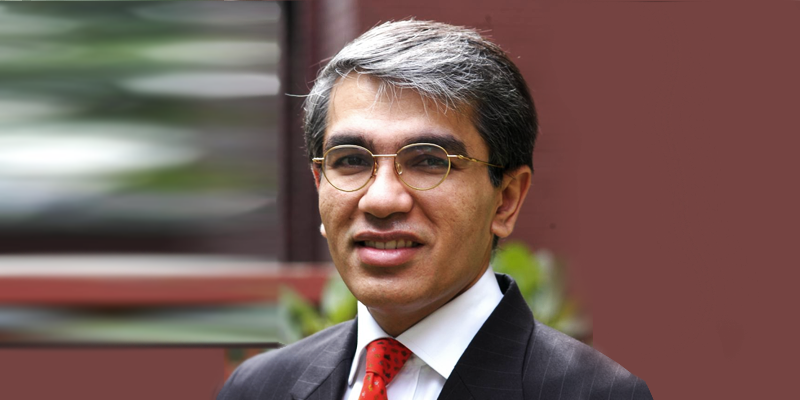Reduce regulatory cholesterol, stay focused on macroeconomic stability: Manish Sabharwal
The government's stance to formalise the economy to generate resources for social measures is the right model forIndia at the current stage of development.

Manish Sabharwal's views on economic and monetary policies in the country are regarded highly, both domestically and even internationally. As the co-founder and chairman of Teamlease, his take on jobs and re-skilling have been of great value for people trying to understand India's progress in this space.
In an exclusive interview just ahead of the Union Budget, Manish outlines the country's urgent needs and concerns.
YourStory: It is said that the upcoming Budget could be a populist one. And that is probably the way it may go. What is your sense? Will the Modi government look to keep aside the tough measures and adopt a softer, more welfare-oriented stance?
Manish Sabharwal: So far, the government has recognised that a 10-year plan is not 10 one-year plans, and that the biggest policy gift you can give job creation is macroeconomic stability. Between 2004 and 2014, mindless populism converted a high growth low inflation economy into a low growth high inflation economy.
That said, a modern state is a welfare state because the market fails many things and many people. I think the stance of the government to formalise the economy to generate resources for social measures is the right model for a 21st-century state at our stage of development.

YS: From a jobs perspective, this government has received widespread criticism. The government was expected to create a lot more jobs during its tenure, but couldn't. How do you view the situation?
MS: I’m not sure this is true unless you believe India’s official unemployment rate of 4.9 percent is a fudge. Everybody who wants a job has a job, but they just don’t have the wages they want or need.
YS: Despite the rise in entrepreneurship, the country has struggled to create more employment. Do you see the trend continuing in 2018 as well? There seems to be no light at the end of the tunnel here.
MS: India doesn’t need more entrepreneurship; 50 percent of our labour force is already self-employed, but this is largely self-exploitation. Not everybody can be an entrepreneur, and not all entrepreneurship is viable. We need more decent wage employment, and despite people’s notion that India is 90 percent informally employed - a toxic consequence of the poverty industry, and an incomplete report on unorganised enterprises - India may now be 75 percent formally employed.
The huge increase in Provident Fund payers, ESI payers, government employment and NPS subscribers cannot be ignored; these may not all be new jobs but they are new formal jobs. And that is India’s problem.
YS: You have always maintained that in India, it's not a jobs issue, but a wage one. Can you elaborate? Do you think this is an India specific issue or a global trend?
MS: This is a global problem; economists are baffled by the breakdown of the Phillips curve where historically unprecedented low levels of unemployment in the US that are not raising wages. Technology is deflationary, and is creating millions of jobs at low wages because technology can’t do everything.
Politics reflects this; the rise of Donald Trump, Brexit, Jeremy Corbyn, etc, reflects an anger at wages that is currently ranting against trade and immigration because you can’t legislate against the microchip
YS: As far as startups are concerned, what are the welfare measures that this government can take? Ease of doing business is not our strongest suite yet. Can't startups be spared, some of the cumbersome procedures?
MS: India is not a fertile habitat for startups because of regulatory cholesterol, bad human capital, and poor infrastructure. I think adoption of India stack - paperless, presence-less and cashless - to all aspects of government, would make life much easier. But fundamentally, we need a mindset change in the civil services, away from prohibited-till-permitted to permitted-till-prohibited.
I think India has reached the limits of exceptions and has also realised it causes corruption - so we can’t do special stuff for startups, but make life easier for all entrepreneurs (big or small, Indian or multinational, technology or services, etc)
YS: What is your on view on demonetisation and job creation. How has it helped?
MS: Demonetisation has massively accelerated 'financialisation', and formalisation, and digitisation. More importantly, it has permanently damaged our risk-less view of cash, and our sense of humour about the rule of law.
India is very economically complex, but translating this complexity into productivity needed moving from deals to rules. One of India’s most corrosive narratives has been that if you follow a rule, you missed a deal. The transmission losses between how law is written, interpreted, practised or enforced need to end, and demonetisation was an important brick in that wall.
YS: Up-skilling the workforce has been a major theme for some time across sectors. What kind of progress have we made on it? Or is it just another slogan?
MS: I think there is a continuum between repair, prepare and upgrade. The upskilling of our workforce is not only about skills; you can’t teach people in a few months what they should have learnt in 12 or 15 years. But clearly, the quality of human capital available to corporate India in the last few hours has improved dramatically. Is this enough? Of course not.
YS: The other buzzwords have been Smart Cities, Digital India, and Make in India. Has the country benefited enough from these initiatives?
MS: I think so. The smart city programme has created a round of competitive federalism that is the only way to spur innovation at the unit of performance - cities. Twenty-nine chief ministers matter for job creation, rather than one prime minister, and I think states competing to improve their rankings, attract investments and digitise workflows are an important component of putting our youth to work.
YS: What are your big hopes with regard to the Budget? What are the things that you would love to see happen?
MS: Steady as she goes - stay the course on macroeconomic stability, reduce regulatory cholesterol, and adopt a timeline for the adoption of the India stack (paperless, presence less and cashless) for all government processes.
YS: Internationally, how much has India's image changed as a place to do business? Do we have a better workforce today, as compared with a decade ago? Do labour issues continue to be image busters?
MS: Substantially. India is not an easy place to do business, but it is changing rapidly and this has made it quite desirable. Almost every boardroom of every multinational is reviewing plans for India or about India.
I think there is already a perception of a well-trained workforce at the high end; our challenges are at the bottom end. I think changing labour laws could be a huge boost, but we need to figure out how to bust the popular narrative that job preservation is a form of job creation that trade unions and the labour aristocracy have been peddling. I think labour laws today pick the old over the young, and that makes no sense in a country with our demographics.






